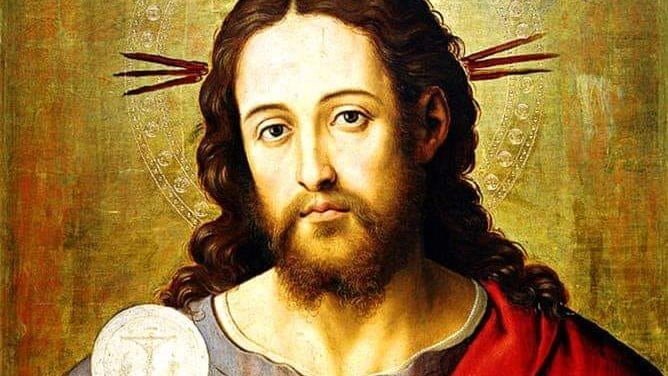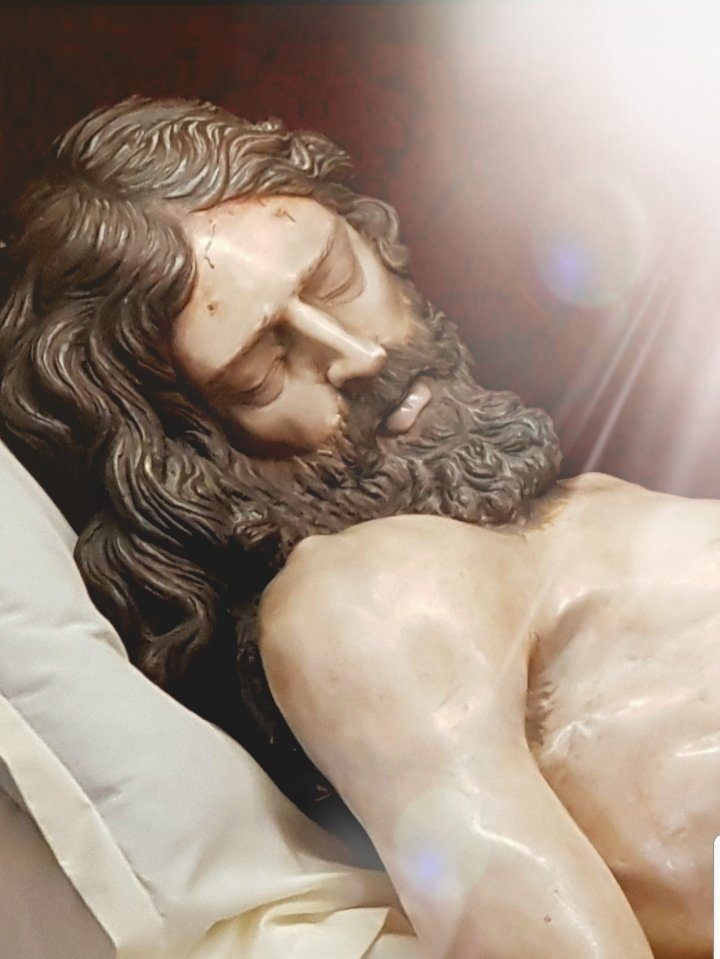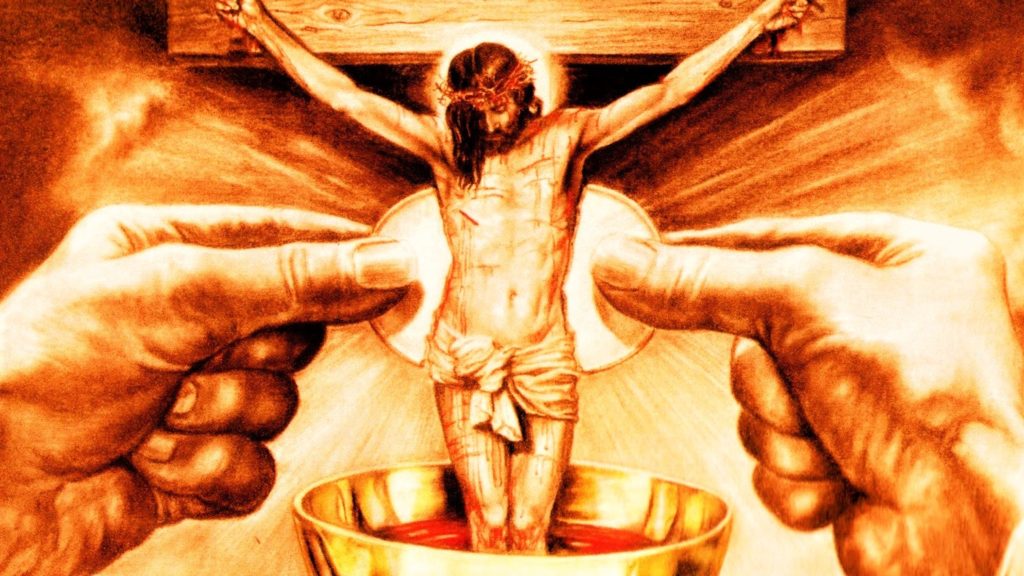Monday, 3rd week of Easter
DAILY GOSPEL AND COMMENTARY:
“DO NOT WORK FOR THE FOOD THAT PERISHES.”
Jn 6:22-29.

READING I
Acts 6:8–15
Stephen, filled with grace and power, was working great wonders and signs among the people. Certain members of the so-called Synagogue of Freedmen, Cyreneans, and Alexandrians, and people from Cilicia and Asia, came forward and debated with Stephen, but they could not withstand the wisdom and the Spirit with which he spoke. Then they instigated some men to say, “We have heard him speaking blasphemous words against Moses and God.” They stirred up the people, the elders, and the scribes, accosted him, seized him, and brought him before the Sanhedrin. They presented false witnesses who testified, “This man never stops saying things against this holy place and the law. For we have heard him claim that this Jesus the Nazorean will destroy this place and change the customs that Moses handed down to us.” All those who sat in the Sanhedrin looked intently at him and saw that his face was like the face of an angel.
RESPONSORIAL PSALM
R. Blessed are they who follow the law of the Lord!
Or: Alleluia.
Beáti qui ámbulant in lege Dómini.
Though princes meet and talk against me,
your servant meditates on your statutes.
Yes, your decrees are my delight;
they are my counselors.
R. Blessed are they who follow the law of the Lord!
Or: Alleluia.
I declared my ways, and you answered me;
teach me your statutes.
Make me understand the way of your precepts,
and I will meditate on your wondrous deeds.
R. Blessed are they who follow the law of the Lord!
Or: Alleluia.
Remove from me the way of falsehood,
and favor me with your law.
The way of truth I have chosen;
I have set your ordinances before me.
R. Blessed are they who follow the law of the Lord!
Or: Alleluia.
ALLELUIA
Man does not live on bread alone, but on every word that comes from the mouth of God.
Gospel of Monday, 3rd week of Easter.
Jn 6:22-29
[After Jesus had fed the five thousand men, his disciples saw him walking on the sea.] The next day, the crowd that remained across the sea saw that there had been only one boat there, and that Jesus had not gone along with his disciples in the boat, but only his disciples had left. Other boats came from Tiberias near the place where they had eaten the bread when the Lord gave thanks. When the crowd saw that neither Jesus nor his disciples were there, they themselves got into boats and came to Capernaum looking for Jesus. And when they found him across the sea they said to him, “Rabbi, when did you get here?” Jesus answered them and said, “Amen, amen, I say to you, you are looking for me not because you saw signs but because you ate the loaves and were filled. Do not work for food that perishes but for the food that endures for eternal life, which the Son of Man will give you. For on him the Father, God, has set his seal.” So they said to him, “What can we do to accomplish the works of God?” Jesus answered and said to them, “This is the work of God, that you believe in the one he sent.
GOSPEL COMMENTARY from the Navarre Bible, Commentary to the Gospel of St. John (with permission)
v. 26 Our Lord begins by pointing out that their attitudes are wrong: if they have the right attitude they will be able to understand his teaching in the eucharistic discourse.
- “You seek me”, St Augustine comments, “for the flesh, not for the spirit. How many seek Jesus for no other purpose than that he may do them good in this present life!… Scarcely ever is Jesus sought for Jesus’ sake” (In Ioann. Evang., 25, 10).
- This verse marks the beginning of the discourse on the bread of life which goes up to v. 59. It opens with an introduction in the form of a dialogue between Jesus and the Jews (vv. 26-34), in which our Lord reveals himself as the bringer of the messianic gifts. Then comes the first part of the discourse (vv. 35-47), in which Jesus presents himself as the Bread of Life, in the sense that faith in him is food for eternal life. In the second part (vv. 48-59) Christ reveals the mystery of the Eucharist: he is the Bread of Life who gives himself sacramentally as genuine food.
v. 27 Bodily food helps keep us alive in this world; spiritual food sustains and develops supernatural life, which will last forever in heaven. This food, which only God can give us, consists mainly in the gift of faith and sanctifying grace. Through God’s infinite love we are given, in the Blessed Eucharist, the very author of these gifts, Jesus Christ, as nourishment for our souls.
- “On him has God the Father set his seal”: our Lord here refers to the authority by virtue of which he can give men the gifts he has referred to: for, being God and man, Jesus’ human nature is the instrument by means of which the Second Person of the Blessed Trinity acts.
- St Thomas Aquinas comments on this sentence as follows: “What the Son of Man will give he possesses through his superiority over all other men in his singular and outstanding fullness of grace…. When a seal is impressed on wax, the wax receives the complete form of the seal. So it is that the Son received the entire form of the Father. This occurred in two ways; eternally (eternal generation), which is not referred to here because the seal and the sealed are different in nature from one another; what is referred to here is the other manner, that is, the mystery of the Incarnation, whereby God the Father impressed on human nature the Word, who is the reflexion and the very stamp of God’s nature, as Hebrews 1:3 says” (Commentary on St John, in loc.).
VIDEO REFLECTION 1
TOPIC: WILL YOU STOP FOLLOWING JESUS IF YOUR PRAYERS ARE NOT GRANTED?
In today’s gospel reading, the crowd searches for Jesus after they were fed with just five loaves of bread and two fish. Jesus tells them they are searching for him for the wrong reasons. They wanted the same manna that Moses provided them in the wilderness when they became hungry as they wandered for 40 years. But Jesus tells them that they have a deeper hunger, a spiritual hunger that He can only give. Jesus tells us, too, to search for Him for who He is rather than what He can give us. Let us reflect today on this question: why do we seek God? Is it because we only need Him to solve our problems? Are we seeking Him for the right reasons?
VIDEO REFLECTION 2
Stay updated: subscribe by email for free TO OUR NEW WEBSITE www.catholicsstrivingforholiness.org (PUT YOUR EMAIL IN THE SUBSCRIBE WIDGET).
We are also in www.fb.com/Catholicsstrivingforholiness. Kindly help more people in their Christian life by liking our page and inviting your family, friends and relatives to do so as well. Thanks in advance and God bless you and your loved ones! Fr. Rolly Arjonillo

